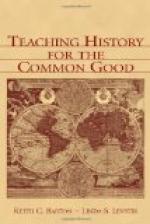Good reviews will develop a knowledge of the sequence of events
But it may be seriously questioned whether many teachers, in their zeal to escape the over-emphasis of dates, have not gone to the extreme of neglecting them altogether. That a student should remember sufficient dates to fix in his mind the sequence of important events is hardly open to question. That he can never do so without some special attention to dates is equally indisputable. Without doubt, drill in important dates is necessary, but it should be so conducted as to take but little time. Each day the teacher has indicated the dates worthy to be remembered and has been careful to select the landmarks of history. He has called attention to the various collateral circumstances which might assist to fix the dates in the child’s mind. The student has kept his list of dates in the back of his text or in some convenient place of reference. Once a week for three minutes the teacher gives the class a rapid review on the dates contained in the list. Occasionally the class are sent to the board and asked to write the dates of the reigns of the English monarchs from William down to the point which the class has reached, or the Presidents in their order, or some other similar exercise calculated to give a backbone to the history being studied. The class will know that such a review is liable to be given at any time. They will endeavor to be prepared. The result will be that with the expenditure of a few minutes at intervals in rapid review, history will cease to be a spineless narrative and become for the student an orderly procession of events. Drill in dates is only one method to this end. There may be a rapid review in battles, generals, wars, treaties, proclamations, and inventions. Such exercises encourage the classification of facts and stimulate fluency of expression. It is of the highest importance for the student so to arrange in his mind what he has learned in recitation that he can call to his command at a second’s notice the fact, date, or illustration he desires. There will be many times in his school and college career when such an ability will be indispensable; in business or the professions it is an invaluable asset, infinitely more useful than the history itself. It will be well for the teacher to inquire: “What am I doing to cultivate such an ability in my students?”
They will give a view of the whole subject
Few teachers will deny that too little time is spent in giving the student a general view of the whole subject, either in its entirety or in its various phases. The text has been studied by chapters or by months or by movements. The history as a whole has never been seen. By the time the student has reached the “Aldrich Currency Plan” in American history he has forgotten all about the experiments with the first United States Bank. He could no more outline the financial history of the United States as given in his text than he could outline the industrial or political history of the American people. And yet he has studied the facts given in his textbook; he has supplemented the text by his work in the library, and in the recitation; he has done everything that may reasonably be expected of him, except to assemble his historical information and review it as a whole.




